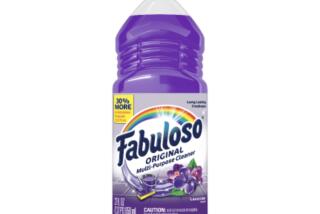Pen Maker, EPA Settle Complaint on Health Claims
- Share via
A Buena Park pen maker will pay $35,000 to settle a federal complaint alleging the company claimed, without adequate proof, that one of its ballpoints could prevent bacterial infection.
The packaging on Micro Pen of U.S.A. Inc.’s Micro Cleen-Ball states that the plastic ballpoint’s casing contained an additive that could kill germs on users’ hands, Environmental Protection Agency officials said.
But Micro Pen had not conducted tests to back up its promise, the agency said. It also failed to get EPA approval to market the product as a pesticide, which is how the agency viewed the statements on the packaging.
Company executives said they agreed last year to stop selling the Micro Cleen-Ball and removed it from store shelves.
The EPA action against the company is part of a national crackdown on products that falsely claim to have infection-prevention powers. Untested products have proliferated in the last few years after several high-profile scares about E coli, salmonella and flesh-eating bacteria.
“We need to make sure there’s enough information for consumers to know these products work and aren’t harmful,” said Kay Rudolph, outreach coordinator for the EPA’s pesticide program in several Western states. “Otherwise, people might be inclined to skip normal hygiene. That’s where these claims become dangerous.”
The label on the Micro Cleen-Ball pen stated that it could “reduce the chance of bacterial infections such as food poisoning; skin, eye, and ear infections; bronchitis; and urinary tract infections, and would contribute to healthier environments in day care centers, hospitals, laboratories and military facilities.”
Though the pen label’s promises remain unproved, company executives maintain that the product works.
Micro Pen agreed to pay the fine because executives didn’t know about the EPA registration requirements, said Chang Park, the company’s marketing director.
“We did tests in the United States with five different bacteria and it killed 98% of them within 12 to 16 hours,” he said.
Park said the model had not been in U.S. stores for long before the EPA intervened, but he could not say how many were sold. The company’s Korean parent still sells the pen overseas, he said.
The EPA has approved several products with verifiable health claims.
One company markets agency-approved knives with handles impregnated with an anti-bacterial additive, said Annie Yates, an EPA investigator. But, she noted, rising consumer fears about bacterial outbreaks have prompted a flood of unproved, unregistered products.
The EPA has cited 10 other Southland companies since last year for selling unregistered or unproved products--from cutting boards to washcloths to fruit and vegetable rinses--marketed as germ killers. Three companies have settled, agreeing to pay fines and to change their practices. The other cases are pending.
Micro Pen’s fine was calculated based on the number of violations--EPA inspectors pulled 25 invoices showing Micro Cleen-Ball sales--and on the company’s ability to pay.
More to Read
Inside the business of entertainment
The Wide Shot brings you news, analysis and insights on everything from streaming wars to production — and what it all means for the future.
You may occasionally receive promotional content from the Los Angeles Times.










